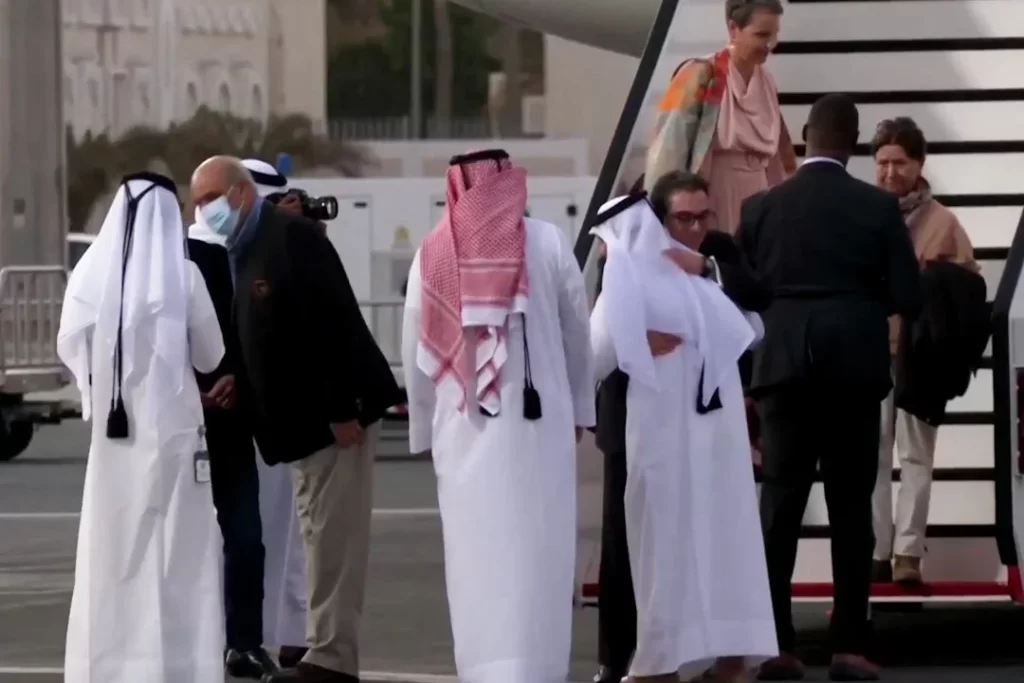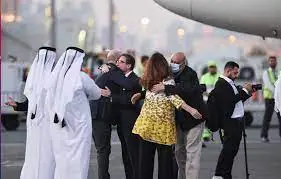
Iran, President Biden announced that five Americans who had been detained in Iran were released on Monday following two years of intense negotiations in which the US agreed to unfreeze $6 billion in Iranian oil revenue and drop federal charges against five Iranians accused of breaking U.S. sanctions. As Mr. Biden and Ebrahim Raisi, the president of Iran, were scheduled to attend the annual United Nations General Assembly gathering of global leaders in New York on Tuesday, the news that the Americans had taken off on an aircraft from Tehran just before 9 a.m. Eastern time was announced.
The five Americans travelled to Doha, the capital of Qatar, for a Cold War-style swap with two of the five Iranians, some of whom had been jailed for years at Evin Prison, one of Iran’s most infamous prisons. In addition, three more reportedly said they would not go back to Iran. According to a senior administration official, the Americans had a quick medical inspection in Doha before boarding a U.S. government aircraft. They arrived to a military facility in Virginia around 5:30 a.m. on Tuesday.
In a statement, Mr. Biden said that “five innocent Americans who were imprisoned in Iran are finally coming home.” He added that they “will soon be reunited with their loved ones — after enduring years of agony, uncertainty and suffering.” White House officials said the president held an “emotional call” with the families of the Americans. The prisoner release was a critical breakthrough in a yearslong standoff over Americans who were imprisoned in Iran. But the terms of the deal have generated intense criticism from Republicans who say that releasing billions in oil revenue amounts to paying a ransom and would lead to the taking of more hostages.
The agreement is also a part of the Biden administration’s broader attempt to defuse tensions with Iran, which have risen sharply in the years since President Donald J. Trump reneged on the 2015 agreement that set restrictions on Tehran’s nuclear programme. However, administration representatives disputed that the agreement represented a significant change in the long-standing hostility between the United States and Iran. Financial restrictions and strong oversight, according to Mr. Biden’s top advisers, will prohibit Iran from using the money for anything other than food, medicine, and other humanitarian supplies. However, they recognise that the deal may let Iran to use money it would otherwise be spending on such products for other objectives.
Sen. Tom Cotton, a Republican from Arkansas, posted on X, the social networking site that replaced Twitter, “Joe Biden’s embarrassing appeasement not only makes Iran stronger, it makes America less safe.” Officials from the Biden administration stated that the deal with Iran was the only option to secure the release of the five Americans, who according to the United States were illegally held captive by the Iranians in appalling conditions.
One of the released Americans, Siamak Namazi, said in a statement that his 2,898 days of “torment” in jail had made him dream of freedom for over eight years.
“My heartfelt gratitude goes to President Biden and his administration, which had to make some incredibly difficult decisions to rescue us,” he said. The Americans — Mr. Namazi, Emad Sharghi and Morad Tahbaz, as well as two others who have not been named at their families’ request — had been jailed on unsubstantiated charges of spying. They had spent the last several weeks in Iran in home detention after Tehran agreed to release them from prison while the $6 billion transfer, a complicated process, was completed. American officials said that Mr. Namazi’s mother and Mr. Tahbaz’s wife were also on the plane out of Iran. Both women are Americans and had been prevented from leaving the country.
The United States told Iran that the transfer of around $6 billion in Iranian oil earnings from South Korea to a Qatari bank account had been accomplished at the same time as the prisoner swap. “This action was taken strictly to address a humanitarian need,” Mr. Raisi told reporters on Monday in New York. He said, “These were funds that belonged to the people of Iran.” The Trump administration’s top Pentagon official, Mick Mulroy, stated on Monday that the release of the funding would “likely give countries that incarcerate Americans as political hostages more reasons to do so.”
Travellers visiting Iran and other nations where there is a significant chance of being wrongfully arrested were advised against going by Secretary of State Antony J. Blinken on Monday. Despite the U.S. government’s repeated warnings against it, he added, “there is no way to guarantee a similar outcome for other Americans who decide to travel to Iran.”
The release took occurred two days after the first anniversary of the Iranian revolt, which started when Mahsa Amini, 22, died while in the morality police’s care. In the subsequent government crackdown, hundreds of people died—including at least 44 minors—and the UN estimated that 20,000 Iranians were detained. To stop new rallies, the government has detained scores of people over the last two weeks.
Hadi Ghaemi, the executive director of the Centre for Human Rights in Iran, a New York-based advocacy group, claimed that “the international attention is now diverted from the ongoing horrific human rights situation in the country.” The timing of the uprising’s anniversary is “seen as a slap in the face of Iranian people inside the country and has enraged many.” The American inmates’ release was conditional on the $6 billion reaching the Doha bank account, and Iran had no control over that procedure, according to representatives of Iran’s delegation to the UN, who dismissed the allegation.
Despite all of them being charged with federal crimes, only a small number of the Iranians participating in the transaction were imprisoned in the US. According to the terms of the agreement, the charges will be withdrawn. A number of them are citizens of the US permanently. Two of the imprisoned Iranians, according to American authorities, made the decision to return home on Monday. Nasser Kanaani, the spokesperson for Iran’s foreign ministry, stated that two will stay in the United States and one would go back to a third nation where he has relatives.
The Iranians were identified as Kaveh Afrasiabi, 65, a dual Iranian-American businessman who pleaded guilty to conspiring to illegally export technologies, Reza Sarhangpour Kafrani, 48, a dual Iranian-Canadian citizen accused of exporting lab equipment for Iran’s nuclear programme, Mehrdad Ansari, who is currently serving a five-year prison sentence for obtaining military equipment, Kambiz Attar Kashani, 45, and Amin Hasanzadeh,
Hasanzadeh has said that he would go back to Iran.
The White House’s coordinator for the Middle East and North Africa, Brett H. McGurk, met with representatives in Oman in early May, which sped up negotiations to free the Americans from Iran. After Iran placed the inmates under house arrest in August, U.S. officials declared they would hold their celebrations outside of Iran and on friendly territory. The Levinson Act, named after former F.B.I. agent Bob Levinson, who was allegedly held captive by Iran for years before his death, was violated by Iran’s Ministry of Intelligence and Mahmoud Ahmadinejad, the country’s former president, according to new sanctions announced by the White House on Monday.
The Biden administration has worked hard over the past three years to secure the release of Americans detained abroad. The release of Paul Rusesabagina, a jailed human rights activist in Rwanda, was achieved by the US in March. In December, Russia consented to free American basketball player Brittney Griner in exchange for Viktor Bout, a convicted Russian arms dealer dubbed the “Merchant of Death.” Other Americans, though, are still detained. Evan Gershkovich, a reporter for the Wall Street Journal, was imprisoned and charged of spying by Russia in March. According to Mr. Biden, his team is attempting to obtain Mr. Gershkovich’s release.
In his statement on Monday, the president said too many people were being held unjustly in Russia, Venezuela, Syria and elsewhere around the world. “We remain unflinching in our efforts to keep faith with them and their families,” he said, “and we will not stop working until we bring home every American held hostage or wrongfully detained.”


